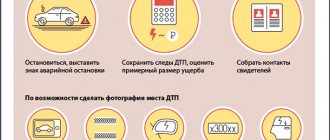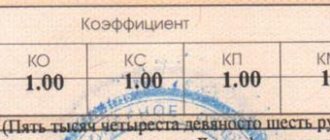Should I contact a car lawyer?
This question cannot be answered unequivocally. But with a high degree of probability it is worth it. The fact is that judicial and pre-trial processes always contain a large number of procedural actions, errors in which are worth the lack of certain evidence. And insurance companies have their own lawyers.
However, the procedure to follow if the insurance company refuses to pay or repair is not so complicated. It’s just that there are non-standard situations in the form of unpopular grounds for refusals (for example, an unobvious third party to an accident, an unobvious guilt of a person).
Your representative will always evaluate the prognosis of the case before proceeding with it and charging you for payment.
You can contact an auto lawyer absolutely free of charge, and he will be able to advise you specifically on your insured event!
Important! Didn't receive an answer to your question? Our expert lawyers work for you. It's absolutely free!
- Only practicing traffic lawyers
- Anonymously
- For free
or call toll free number 8
✖
What nuances should you pay attention to when contacting a car lawyer when the insurance company has refused to pay under compulsory motor liability insurance:
- a competent auto insurance lawyer will always study the case at the stage of getting to know you before concluding a contract; if the representative immediately proposes to conclude an agreement, then this is the “wrong lawyer”,
- not all lawyers are equally useful; study the experience and number of cases won by an auto lawyer specifically regarding insurance refusals; you can do this simply by searching by the name of the representative on the websites rospravosudie.com and sudact.ru,
- prices for the services of auto lawyers for refusals of insurance companies to pay or repair vary greatly: on average from 4-5 thousand rubles to 12-15 thousand; in such cases it is also often customary to give “prizes” - a certain payment if the case is won upon its completion.
When conducting business, you will need to conclude an agreement with your representative, pay an advance payment or the full amount at once and write out a power of attorney (power of attorney form below), which can be certified by your employer or notarized.
Package of documents for going to court
You know what to do if the insurance company refuses to pay under MTPL. The insured, taking a responsible approach to the issue of filing a claim in court, has the right to submit not only his claim with certificates of the insured event, but also a written refusal from the insurer to pay for the damage.
The MTPL Law regulates the list of documents required to apply for compensation.
In order for a claim to be considered in a civil court, almost the same list of certificates will be required.:
- Notice;
- Protocol;
- Insurance policy of the instigator of the accident (number, copy);
- Damage assessment report (copy);
- Claim.
In court, you are free to challenge not only the MTPL refusal to pay, but also receive unpaid compensation with an additional penalty.
When is denial of insurance payment legal?
So, your motor third-party liability is insured under OSAGO. This means that you are insured against fault in an accident - the insurance company will compensate for the damage on your behalf if you are the culprit of the accident.
Part 25 of Article 25 of the Federal Law “On Compulsory Motor Liability Insurance” gives the insurer the right to refuse such compensation in cases provided for by law. Let's look at cases where the insurance company's refusal to pay is based on the law.
If you have an incomplete set of documents regarding an accident
We have already discussed in a separate article how to correctly submit a complete list of documents. It depends on whether the accident caused damage only to property or to the health and life of people.
If the package of documents is incomplete, then the insurance company has the right to legally refuse repairs or payment.
If you do not provide the car for inspection by the insurance company
This risk for the driver often appears when applying for a European protocol. The point here is that both in cases where the accident was registered with the help of it, and if without it, the driver is obliged not to begin repairing the car and not to dispose of it (or what’s left of the car) within 15 calendar days and request from the insurance company to provide the vehicle for inspection within this period.
If this is not done, there will be a refusal of insurance payment or repair, and it will be legal.
Free consultation with a traffic lawyer: 8 (Moscow and region), 8 (all of Russia - free call)
What to do if you refuse?
The subtlety of the auto law here is that, according to Part 20 of Art. 12 of the Federal Law “On Compulsory Motor Liability Insurance” (here and below this law will be implied), simply the fact of repairing a car or its disposal does not immediately cause a refusal. The latter is possible only if such an action by the car owner does not allow one to establish the very fact of the existence of an insured event or to estimate the amount of compensation from the insurance company.
But this also does not mean that you can simply immediately do an independent examination and, based on its results, apply for payment. As practice shows, in this case you will also receive a refusal, and judicial practice in 2021 and previous years supports the trend - if you do an independent examination and repair the car without inspecting the insurer, then the judges will support the insurance company’s decision to refuse to pay you.
As you can see, proving the opposite is a rather complicated procedure due to ambiguous judicial practice. Therefore, in this case, it is best to contact a car lawyer to assess the prospects of such a case.
If the insurance company did not satisfy your claim for compensation, demanding that you bring them a car, but it is not driving, and you stated this directly to the insurance company, then the refusal as of 2021 will be unlawful. Even if the car is not running, it was not the result of an accident. And, for example, due to a broken wheel and lack of a spare wheel. You don’t have to give a reason for this at all, but simply report that the car is not running.
In the latter case, read below for instructions on asserting your rights in the event of refusal of payment or repair due to failure to present the car.
If the OSAGO policy is fake
Obviously, when the policy of the culprit turns out to be fake, the insurance company is not obliged to pay compensation for the accident to the victim, and in this case, you will also have to apply for compensation from the culprit. But fake insurance does not always lead to refusal. We discussed such cases and what to do in such cases separately in the article about a fake OSAGO policy.
If the insurance company is bankrupt
Then you will have to contact the Russian Union of Auto Insurers, which already insures the insurance companies themselves against bankruptcy.
The procedure for contacting this body is similar to applying to the insurance company with the same set of documents. The only difference is that refusal from RSA is much less likely than from insurance, and also no repairs - only payment in money. Instructions for applying in this case are on the official website of the RSA.
If you contacted the wrong insurance company
The insurance company refuses to pay if you apply to the wrong address. The fact is that the law clearly regulates when you need to contact your insurance company, and when - only to the insurer of the culprit.
So, you need to contact the company where you took out your MTPL policy when:
- damage was caused only to cars or other property, but there were no injuries or deaths,
- all participants in the accident have a valid MTPL policy.
If you require compensation for damage not covered by MTPL
The auto insurance policy does not insure all the driver’s risks, but only the main ones. There are a number of exceptions when the insurance company can legitimately refuse to pay or repair, and the instructions in this case simply will not help.
So, the insurance refusal is legal in the following cases:
- You have applied for compensation for moral damages from an accident,
- You have applied for compensation for lost profits, compensation for lost working hours,
- at the time of the accident, the car was participating in competitions or conducting training driving,
- You are seeking compensation for damage caused to the environment or rare or unique objects, as well as if cash, jewelry, shares and copyrights were destroyed as a result of the accident.
All these points are regulated by Article 6 of our law.
Refusal to pay compensation for an accident registered under the European Protocol
Even if an accident is registered under the European Protocol, the insurance company may try to refuse payment. This practice is quite common in cases where:
- the culprit does not fulfill his obligations;
- the notification of the accident was issued in violation of the form or with errors.
Errors in the notice can be corrected by re-drawing the form. Re-registration is carried out in the presence of the person responsible for the accident, so you will have to negotiate with him. All obligations of both parties to the incident must be fulfilled.
If payment was denied because the person at fault for the accident did not inform the insurance company about the incident and did not provide a car, then such actions can be considered illegal. In such a situation, the victim can safely file a complaint directly with the Central Bank or RSA.
The most correct decision when drawing up a notification of an accident according to the European Protocol would be to call a traffic police officer - this will allow you to avoid possible inaccuracies and errors.
The practice of considering cases related to refusal to pay under compulsory motor liability insurance is quite rich. The vast majority of such cases ended in favor of the victim.
When does the insurance company have no right to refuse payment?
Meanwhile, a large number of cases cannot be the basis for the insurer to refuse compensation for damages. Such cases include:
- Missing the deadline for reporting, including when registering an accident under the European protocol,
- refusal of the insurance company to go to a car that is not running, and this is indicated in the application for payment,
- if the OSAGO policy is fake, but the form itself belongs to the insurer (more details in the article),
- if the injured driver was drunk, refused to testify and committed any other violations that do not affect his guilt in the accident,
- if you do not have MTPL insurance, in this case you just need to contact the company at fault,
- if the insurance company requires documents that are not on the mandatory list, and you did not provide them,
- You or the culprit do not have a diagnostic card,
Contacting the insurance company - step-by-step instructions
So, what to do if an insured event occurs? In fact, the procedure is simple:
1. You need to collect all the documents regarding the accident, fill out a notice and write an application for insurance payment.
2. Next, you need to either take these documents personally to the insurance company, but then demand an act of acceptance of documents (which, in fact, they are not required to give you), and film the process of submitting documents one by one on video.
But it is better to send a set of documents by registered mail with acknowledgment of receipt, and keep the receipt and notification. Next, when the letter is received by the insurance company, you will receive a notification of delivery - you also need to keep it, and also remember the date of delivery - the countdown of the compensation period begins from there.
3. Now you need to wait 20 calendar days (this does not include days that are officially considered non-working holidays) for payment or referral for repairs. Also, from the date of receipt of the letter with the documents or handing them over to you personally in the office, the insurance company has 5 days to inspect the car.
4. Based on the results of this period, there are 3 possible outcomes of events:
- You will receive payment or a referral for repairs within 20 days (or a little later),
- You will receive a reasoned refusal to pay or repair from the insurance company,
- the insurance company will not react in any way - there will be no refusal or compensation for damage.
The last point, in fact, is tantamount to refusal. We will consider below what to do in each such case.
Claim work
Before filing a claim in court, it is advisable to go through the procedure for peaceful settlement of the dispute. If the dispute can be resolved amicably, this will save the policyholder from unnecessary expenses associated with the legal process.
To do this, a letter of claim is sent to the head of the insurance company.
Note! The method of voluntary resolution of a dispute is not mandatory under consumer protection legislation.
The letter indicates the policyholder's data, describes the occurrence of the insured event, the amount of harm caused, including life and health, and the requirements with justification for their disagreement with the actions of the addressee. An inventory of the attached supporting documents is made.
The claim is sent to the opponent either by registered mail with notification, or transmitted by hand with a note on its copy indicating the date of receipt.
After the insurer receives a claim, within ten days, excluding non-working holidays, it is obliged to consider it and satisfy the insured’s request or send a reasoned refusal (clause 1 of article 16.1 of Federal Law No. 40).
Attention! The insurer is obliged to pay the insurance payment in the part not disputed by it (clause 4.25 of the Regulations of the Bank of the Russian Federation N 431-P).
If the insurer refuses to satisfy the requirements or does not receive a response within the legal period, then the next step will be to go to court.
Advice! It is possible to avoid litigation by filing complaints with the union that protects the rights of policyholders, the prosecutor's office and/or the Bank of Russia (Article 30, 41 Federal Law N 4015-1).
We receive a refusal and evaluate the prospects
So, if you have failed and you are faced with one of the last 2 items in the list above, then you should not despair. The insurance company’s refusal may not be a failure at all, but an additional “bonus” if the case is won, which can result in amounts exceeding the cost of compensation for damage from an accident.
What are these “bonuses”? We will look at them in detail below, but here is a short list:
- the actual amount of damage will be assessed by an independent organization, which means that it will not be underestimated or less underestimated (due to the calculation method taking into account wear and tear),
- after 20 days of the period for compensation, the insurance company pays 1% for each day of delay of the amount of damage,
- in case of refusal to pre-trial settlement of the dispute, the insurer is entitled to a fine of 50% of the amount of payment in favor of the plaintiff,
- It is often possible to recover a small amount of moral damages .
And all this without taking into account the fact that if you win the refusal, the insurance company will reimburse you for all current expenses, including a car lawyer, examination, forwarding mail, telegrams and others, if any.
As we understand, the main thing we need is to win the trial. And for this we need to understand on the basis of what we were refused. There can be a lot of reasons.
And it is at this stage that we recommend consulting with a competent auto lawyer, who may not take the case upon himself, but will be able to assess your risks and chances of proving you are right.
Automotive Ombudsman
From June 1, 2021, Russia has a new scheme for pre-trial and judicial resolution of disputes regarding insurance compensation for damage from road accidents and a new administrative position - financial ombudsman. This person will act as a mediator in insurance disputes under compulsory motor liability insurance with compensation for damage in the amount of up to 500,000 rubles. His participation in dispute resolution is free for individuals, and free for insurers if the insurance company wins the case, and 45 thousand rubles if the individual wins in court.
The Ombudsman acts and makes decisions in accordance with the legislation of the Russian Federation. The parties either agree to a settlement during pre-trial negotiations, and then the ombudsman’s decisions are binding, or they disagree and can challenge them in court.
Important! The Ombudsman has the authority to consider disputes that were three years old and disputes about changes in the amount of compensation (if there was no court decision), as well as the right to demand a reasoned response from the insurer regarding the refusal of insurance compensation issued 3 months ago (the response must be given within 15 days).
Let's sue the insurance company - step-by-step instructions (+ pre-trial claim)
So, we received a refusal from the insurance company to compensate for the damage, and the question arises of what to do next. We will break down the answer to this question into 3 important steps:
- independent examination,
- pre-trial settlement of the issue,
- filing a lawsuit for refusal.
Independent examination
It is done for a financial assessment of the damage - in order to file a claim with the insurance company, we need to know the amount of money that we want to recover. It may not be required if the insurance company itself assessed the damage and issued you an assessment or examination report with a known amount of damage. But it may also be underestimated.
It is impossible to independently conduct such an examination by simply monitoring prices and compiling a table of them - neither the insurance company nor the court will accept such a calculation.
Carrying out an independent examination is paid and costs on average from 5 to 15 thousand rubles, depending on the degree of damage and the pricing of the office itself. These expenses are reimbursed if the case is won.
- To do this, simply contact an independent expert who will do everything himself.
- The expert will set a date and time for the examination; it should be no earlier than 5 days after your application. After this, you need to send a telegram to the legal address of the insurance company and invite its representative for an examination no earlier than just these very 5 days. This is an optional procedure, but the courts evaluate this point in a positive way for you. Most often, in practice, insurance representatives do not come.
- Based on the results of the examination, you should be given a check, a copy of the contract for its implementation and, most importantly, an expert opinion with a table of prices for spare parts and labor, photographs of damage and the total amount to be reimbursed. All these 3 documents are important and you will need them in the future. Ask for a duplicate of the expert report, and also take a flash drive or other electronic media with you and ask to upload a photo of the examination to it - you will also need all this.
The calculation is made taking into account wear, alas. Depreciation can be no more than 50% for cars older than 5 years. But it is considered only for spare parts and components. Work must be calculated without taking into account wear and tear.
Also, if the car is not older than 5 years, then an expert at your request (you must ask to do this) can separately calculate the loss of marketable value (LCV) of the car. This is compensation for the fact of the accident itself, because when sold in the future, due to the presence of an accident in the history, your car will cost less on the secondary market.
The TLC is usually about 8-10% of the damage amount.
Pre-trial claim
This is an important step in the dispute with the insurance company and should not be skipped. The case of an insurance company’s refusal to repair or pay is a matter of consumer protection law, and a mandatory attempt at pre-trial settlement of the dispute is required.
For pre-trial settlement you will need the following documents:
- original independent expert report,
- all checks to substantiate the amounts indicated in the claim,
- all the same documents that you submitted when contacting the insurance company, as a result of which the insurance company refused payment and repairs.
How to write a pre-trial claim?
In fact, there is nothing complicated here. You need to describe the nature of the accident, why you contacted the insurance company, on the basis of which you consider the insurance company to be wrong in refusing compensation for damage, and what exactly you are demanding.
There is no approved official form for this document; you write it in free form.
We provide all this data with links to the legislation in force for 2021 in a sample. (DOC format for filling out on a computer).
Next, the claim must be sent by registered mail with return receipt requested to the legal address of the insurer that refused to pay you or make repairs. After the date of delivery, the insurance company has 10 days (indicated in the claim form, it can be increased) to satisfy the “pre-trial”, after which you can file a claim in court.
Something else useful for you:
- Collecting payment without depreciation under compulsory motor liability insurance from the culprit - is it legal and what to do?
- If the person at fault for an accident does not have compulsory motor liability insurance, what to do and how to recover damages?
- Mutual fault under compulsory motor liability insurance - how is payment made?
Lawsuit
So, if the insurance company did not satisfy the pre-trial demand, but refused to pay or send it for repairs, then our next action is to file a claim in court.
There is nothing complicated here either. Since the refusal of an insurance company is a matter falling under the Law on the Protection of Consumer Rights, you can sue the insurer in the city or district court at the place of registration of the plaintiff - that is, at your registered address. The most convenient way to do this is here. Select your region of residence, enter your registration address, and the search service will find the correct court.
Now you need to correctly draw up a statement of claim, indicating all the necessary data with references to the laws on the basis of which you specifically demand from the defendant. The statement of claim does not have an approved form to fill out, but it is important to write it correctly. You can also entrust this matter separately to a car lawyer.
.
Next, this claim must be taken and handed over to the office, having received an incoming number and wait for the subpoena. You, the insurance company that refused to send for repairs or payment, as well as the third party who caused the accident will be called. Depending on the region of residence and the specific court, you will have to wait from 3 weeks to 3-4 months. Alas, the courts cannot cope with the flow of people wishing to sue for insurance compensation and other disputes.
Procedure if the insurance company does not pay under compulsory motor liability insurance
In 90% of cases, unscrupulous insurers do not pay money without explanation. They delay the deadline for accepting documents, look for inconsistencies and can, in principle, “lose” the documents.
There are cases when the insurance company responds in writing to a client’s application about the impossibility of making compensation, arguing the reasons for the refusal and possible solutions to the problems. In all other cases, the insurance company can make a so-called unsubscribe, relying on the illiteracy of the policyholder and his inexperience.
Advice! Insurance companies often frighten the client with their authority, connections and high costs for legal fees, which sometimes demotivates the injured party to continue to demand compensation for damage from an accident. But do not be afraid, judicial practice knows a large number of successful solutions to this problem.
How does the law regulate such a situation?
From the point of view of the law “On Compulsory Motor Liability Insurance”, the insurance company is obliged to give the client a written response to his request within 10 working days. But, as mentioned above, only a small part of the IC acts in this way.
The same regulatory legal act also states that in the event of insufficient documents, the Investigative Committee is obliged to provide a complete list of missing papers and inaccuracies in their execution within 3 working days in writing by mail or by direct contact to the victim. At the request of the victim, the Investigative Committee is obliged to accept electronic copies of the missing documents.
Within a period not exceeding 5 working days from the date of submission of the application, the insurance company is obliged to inspect the car, agree on and sign the report.
If the policyholder disagrees, the company is obliged to organize an independent technical examination to identify discrepancies in the payment amount.
The responsibilities of the insurance company are described in more detail in Article 12 of Federal Law No. 40 (Procedure for the implementation of insurance compensation for harm caused to the victim). Violation of this provision by the insurer becomes a reason for appealing to higher authorities.
Step 1. File a claim
A pre-trial claim is a document that resolves most disputes with the insurance company. Sometimes even a complaint addressed to the head of the Investigative Committee helps solve the problem, but pre-trial proceedings are a more powerful “argument” on the part of the injured driver.
The advantages of such a solution eliminate the need to pay court fees, lawyer services or legal consultations, and waste time on all sorts of hassles.
Important! A pre-trial claim is a preliminary step for filing a claim in court. An attempt to resolve the issue in this way is an additional “plus in karma” for the victim before the court.
Any person can file a pre-trial claim: a citizen of the Russian Federation, a foreigner, a legal entity or an individual. Some insurance companies even have special forms for preparing this document. If you have doubts about the correctness of the registration, it makes sense to seek advice from a lawyer.
Pre-trial claim to the insurance company under compulsory motor liability insurance
Pre-trial claim. Page 2
Expert opinion
Mironova Anna Sergeevna
Lawyer and lawyer for automobile law. Specializes in administrative and civil law, insurance.
Receipt of payment directly depends on the competence of drawing up a pre-trial claim. Therefore, it should contain references to laws, arguments and justifications for the rightness of the victim.
The document can be written in free form, but all the necessary information must be presented there:
- FULL NAME. IC client, his passport details, address, contact phone number;
- for legal entities, it is necessary to indicate the form of ownership, legal name, legal address and telephone number, as well as details of the responsible person;
- name of the insurance company where the pre-trial claim is filed, physical and legal address;
- an explanation of the situation that resulted in the conflict;
- essence of the claim: non-payment of the insured amount, insufficient payment, delay, etc.
- the explanation must contain references to unfulfilled clauses of the contract indicating the article of law that this or that clause regulates;
- requirements indicating the amount of payment.
You should definitely indicate the seriousness of your intentions to go to the end; if the requirements are ignored or not met, the issue will be resolved in court. At the end there is a signature with full name and date.
The following package of documents must be attached to the pre-trial claim:
- A copy of the policyholder's civil passport.
- Copies of PTS or STS.
- OSAGO insurance policy.
- Certificate from the traffic police about a traffic accident.
- Medical certificate if there is damage to health.
- Death certificate, if there are dead.
- Conclusion of an independent examination in case of underestimation of payments.
- Payment documents confirming other expenses, such as postal, ambulance, tow truck, etc.
Within 10 working days, the insurance company is obliged to respond to the pre-trial claim, and this must be either a payment made or a written refusal.
A pre-trial claim is a good tool to influence the insurer, since each day of delay in payment entails the accrual of penalties. In most cases, money is credited to the client’s account within the first 5 days.
Complaint to RSA
The Russian Union of Auto Insurers or RSA is a public organization that monitors the quality of insurance services and the proper execution of compensation payments.
By contacting the RSA or the Central Bank of the Russian Federation, the client of the insurance company can solve the problem pre-trial, or can file a complaint after the claim is rejected.
The cases when it is reasonable to contact the RSA are the same:
- Insurance company does not pay damages after an accident;
- delays payment deadlines;
- compensation has not been paid in full;
- illegally recognizes the case as uninsurable;
- canceled the KBM, and many other situations.
Important! You can file a complaint against an insurance company that has refused to pay its obligations only if it is a member of the organization.
You can contact us by phone:
- +7(495) 641-27-85 – In Moscow;
- 8-800-200-22-75 – Hotline for all regions of the Russian Federation.
The claim is drawn up in paper form, similar to the pre-trial one, and all the same documents are attached to it. You can send it by mail to the address: 115093, Moscow, st. Lyusinovskaya, 27, building 3.
Also, residents of the capital have the opportunity to complain personally at the address: st. Lyusinovskaya (Dobryninskaya metro station), 27, building 3. Addresses of other departments can be found on the official website: autoins.ru
Complaint to the Central Bank of the Russian Federation
Another lever of influence on the insurance company is the Central Bank of the Russian Federation. Based on compelling reasons, the policyholder can file a complaint on the official website of the organization at the link: https://www.cbr.ru/reception/
You can submit in paper form by registered mail to the address: 107016, Moscow, st. Neglinnaya, 12
Important addition! When filing a complaint with the Central Bank, focus on providing evidence of a violation of rights, and also double-check the details and contact information of the complainant.
Copies of the complaint are sent to the regional office of the Central Bank, as well as to the insurance company.
Step 2. Prepare a lawsuit
If the pre-trial claim did not have an impact on the insurance company or it was rejected, the driver has the right to go to court. The plaintiff can choose the authority at the place of registration, and the amount of compensation required should also be taken into account.
If the amount exceeds 50 thousand rubles, then the appeal must be filed in the district court, if less - in the world court.
The statement of claim is written in 2 copies, one of which is sent directly to the court, the second must be delivered to the insurance company by registered mail with acknowledgment of receipt or in person. When applying in person, be sure to receive a copy of the copy with the incoming number.
The claim describes everything that is described in the pre-trial claim, but it is better to draft it by an experienced lawyer who will do everything in the form with references to articles of law.
The application is accompanied by a package of documents similar to the pre-trial one, and when submitting the application, obtain an inventory of them. The application is dated and signed in the prescribed manner.
Sample statement of claim for recovery of insurance compensation. Page 1
Sample statement of claim. Page 2
Expert opinion
Mironova Anna Sergeevna
Lawyer and lawyer for automobile law. Specializes in administrative and civil law, insurance.
The court today is more on the side of motorists, but has a strong influence on the decision whether a pre-trial claim has been filed. If the plaintiff goes straight to court, there will be a lot of checks, the case may drag on, and it is not a fact that it will be successfully won.
The claim should indicate the name of the court, the plaintiff’s data, the defendant’s data, the essence of the problem, and the requirements. A ready-made sample statement of claim can be found here.
How does the court proceed when a payment is refused?
On the appointed day and time specified in the summons, you come to the court, to the office also specified in the summons. Don't be surprised if you're the only one in court. Often the insurance company ignores attending court, although it depends on the insurance company (for example, representatives of Rosgosstrakh often come to court).
However, most likely, the insurance company will file objections as well as motions in court. They may contain:
- a request to conduct a forensic examination with an objection either to the existence of the fact of an accident or to the amount indicated in the examination report,
- objection regarding the guilt of the second participant in the accident.
Most often, the court grants requests for an examination. But what’s even worse is that it’s paid. It is initiated by the insurance company, but subsequently the costs fall on the losing party. If the amount of the claim is reduced as a result of a forensic examination, for example, by 25%, then 25% of the payment for the examination itself will fall on the plaintiff - that is, on you, and 75% - on the insurance company.
There is just one subtlety - the cost of a forensic examination, as a rule, greatly exceeds the prices of independent appraisers. On average, a forensic examination costs from 20 to 50 thousand rubles.
What questions will I be asked?
By the way, you don’t have to come to court at all, but this slightly increases the chances of getting your claim rejected under compulsory motor third party liability insurance. Therefore, it is better to attend the trial.
You may be asked for the following information:
- tell the circumstances of the accident,
- could you have prevented the accident,
- about the nature of the accident and damage.
Don’t worry, the judge is unlikely to “load” you, but he needs to find out all the circumstances of the case about the insurance refusal, so it is important to tell the truth, concisely, but without missing important facts.
If a forensic examination is ordered
Alas, but then you will have to wait again. The case will be postponed and a forensic examination (traceological or conventional) will be ordered. According to the law, the decision on its implementation comes into force only after 15 days. Therefore, only after this period will movement on the issue begin.
An expert will contact you and ask you to drive to the specified address, or he will come himself if the car is not moving. If you have already repaired or sold the car, then the examination will be carried out using photographs. It will be better if you save electronic versions of the photos. It’s even better if the car still hasn’t been repaired. Otherwise, the expert may point out the impossibility of determining the fact that the damage was received as a result of this particular accident, and the court may refuse the claim.
After the examination, the amount of payment will be decided. Yes, now we have bad news for you! Most likely, the judge will reduce the amount of the fine and penalty. Article 333 of the Civil Code of the Russian Federation gives him the basis to do this. It happens that the size of the penalty is reduced tens of times.
The lawsuits have been won - what to do next?
When your claims are satisfied, the insurance company will be obliged to transfer the amount specified in the decision to your account. But all this after the court decision entered into legal force, of course. To do this, the court issues a writ of execution, which is sent directly to the insurance company.
If the insurance company does not pay for it for a long time, then the writ of execution is sent to the bailiffs, and they can already write off the necessary amount from the defendant’s accounts in your favor.
Judicial practice regarding insurance refusals
The most convenient way to familiarize yourself with the full judicial practice in civil cases on issues where the insurance company has refused to pay and repair is on the website of Judicial and regulatory acts of the Russian Federation. Go to the page of litigation regarding insurance refusals.
There is a convenient filter where you can select applicable laws and articles or clauses of laws, or use the search to find solutions similar to your insurance refusal.
You can also search for the judge's last name to find his specific court decisions. You will find out the name of the judge at the step after submitting the statement of claim to the court.
Here are examples of several court decisions on insurance company refusals:
- refusal to satisfy a claim against the insurance company due to lack of evidence of an accident,
- a significant reduction in the insurance payment by the judge in the form of penalties and fines, and one more thing,
- Satisfaction of a claim regarding the insurance company's refusal to pay.
Legality of the insurer's refusal
Such refusals are divided into two categories: justified, that is, legal, and unjustified, which has no legal basis.
Refusal of insurance payment is considered justified if the event that occurred does not fall under the insured event either according to the laws governing the insurance industry or according to the insurance rules.
A refusal is considered unreasonable when, by law or contract, the insured person is obliged to make a payment, but, citing various reasons, does not do so.
Be careful! Insurer companies often refer to the clauses of the insurance contract in their refusals. But the agreement does not always comply with the laws in force at the time of its signing. The terms of such an agreement may be challenged in court.
An integral part of insurance are the insurance rules, which contain a complete and detailed list of grounds for refusal of insurance payment. They are issued to the policyholder upon conclusion of the contract (Article 943 of the Civil Code, Article 3 of Law N 4015-1). This is a voluminous document of 30-40 pages, which differs among different insurance companies and, as a rule, policyholders do not pay due attention to its study. You can find out whether the incident is covered by insurance from this document.











